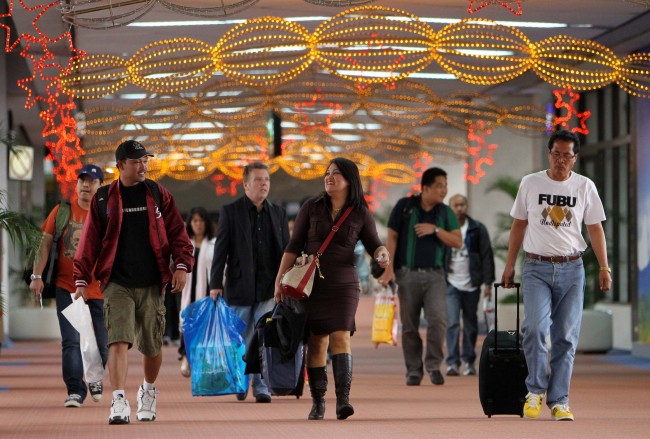AS OF AUGUST 28, 74 overseas Filipino workers (OFWs) are still awaiting repatriation from Libya. Only 1,625 OFWs out of an estimated 13,000 have returned to the Philippines. Due to the worsening conditions in the North African country, workers have been highly encouraged to return home for protection.
The conflict reached a boiling point in July, after two Filipino casualties were reported. The first was the kidnapping and beheading of Antonio Espares, a heavy equipment operator, by militia in Benghazi. The other was a Filipina nurse, abducted and sexually abused by up to six men outside of her residence in Tripoli.
Nearly 100 people have been killed during the intensifying conflict between the various militia groups. The airport has been closed and great damage has been inflicted on power and fuel infrastructure. Because of the situation, residents are kept indoors and foreign missions have begun evacuating their staff and advising people to leave the country.
On July 18, the Department of Foreign Affairs (DFA) raised the security alert level in Libya from 3 to 4, meaning mandatory repatriation due to the worsening peace and order condition. Arrangements for the transportation of OFWs from Libya to the Philippines have already taken place since then. DFA Secretary Albert del Rosario said that he would travel to Tunisia, which borders Libya, to personally oversee the repatriation efforts.
The DFA has been appealing to those who have decided not to return to do so immediately for exit routes out of Libya are closing fast. Despite the government’sefforts, many OFWs still elect to stay in Libya and risk their lives to retain their livelihood.
Middle eastern conflict
The situation in Libya has been rising since early 2011, when Libyan protesters demanded Prime Minister Muammar Gaddafi to withdraw from power. Since his fall, an Islamist-led militia group from the city of Misrata has been trying to seize control of the airport from the Zintan, an anti-Islamist group consisting of mostly ex-army forces.
In an interview with The GUIDON, Lorenzo Jungco IV, special assistant at the Office of the Undersecretary for Migrant Workers’ Affairs (OUMWA) in the DFA, discussed Libya’s weak central government and its inability to impose control over these armed warring groups. These groups are widely supported and exercise control over defined geographic areas. “Not one faction has the necessary strength to subdue all others, hence a low-intensity conflict is raging with no discernable end,” he explains.
The incessant fighting between these factions has greatly affected the normal operations of Libyan life, as well as the lives of Filipinos working there. “Inasmuch, Filipinos are deployed mostly as workers in the government or private businesses in the country, their livelihood were disrupted, not to mention that their lives were placed in danger,” Jungco says.
OFW repatriation
Ever since the DFA raised Libya to Alert Level 4, the government has been trying to bring home the 13,000 OFWs residing in Libya.
The government has already secured ship rentals from Malta, which amounted to a total of US $1.8 billion. Arrangements have been made regarding the logistics of traveling back to Manila. They have also stated that they would pay for the accommodations of Filipinos who have gone to Tunisia to escape conflict.
“There is never a one-size-fits-all solution. All actions, however, are guided by one immutable directive: Protect the lives and ensure the welfare of Filipinos,” Jungco says of the operation.
Still, many refuse to be repatriated because it would entail leaving their jobs, and sometimes, all their possessions. “There is no guarantee that they can return to their former jobs once war or conflict in the receiving country [wanes],” explains University of the Philippines Assistant Professor, Henelito Sevilla Jr., who has a doctorate in international relations.
“Their level of income while deployed overseas is high, and they are worried that they may not be able to find local employment that would be commensurate to their previous income level. Some are apprehensive whether they could find any work at all,” Jungco adds.
The government’s response
In order to appeal to those still undecided, Jungco says they orient the Filipinos on the deteriorating security situation, point out that their lives are at risk, and convince them to go back to the Philippines.
However, Sevilla points out that the repatriation problem does not end after the workers have returned home. The next and arguably more difficult step is to find secure and stable employment locally. “The greatest challenge for our repatriated OFWs and the Philippine government,” he says, “is where to relocate them, and—if they opt to stay inthe Philippines—what sort of livelihood they will engage in.”
The government currently has a series of programs aimed at assisting the return workers. These include temporary lodging, legal assistance, free vocational training, scholarship assistance, and even business loans worth up to 3 M pesos. Whether these programs will be enough, however, remains to be seen.




